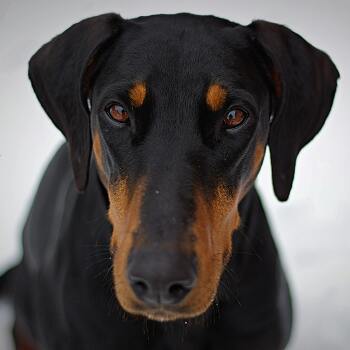Doberman Pinschers

Doberman Pinscher: Loyal, Bold, and Always By Your Side
Looking for a dog that’s sleek, smart, and steadfast? Meet the Doberman Pinscher—often called the “Dobie”—a breed that blends athleticism, loyalty, and protectiveness into one striking package.
Why Dobermans Win Our Hearts
- Devoted Protector: Dobies are famously loyal. They form deep bonds with their families and are known to stick close to the ones they love.
- Top of the Class: Intelligent and eager to learn, Dobermans rank among the most trainable dog breeds. Whether it’s basic commands or agility courses, they aim to please.
- Family-Oriented: Despite their tough reputation, Dobies are affectionate and sensitive. With proper socialization, they’re excellent companions for children and thrive in a loving home environment.
- Fitness Buddy: Active households are a perfect match for this high-energy breed. They love long walks, runs, and games that challenge both their body and brain.
- Natural Watchdog: Born to be alert, Dobies are naturally protective—no extra training needed. Their presence alone is often enough to deter trouble.
Things to Keep in Mind
- Needs Early Socialization: Dobermans can be wary of strangers and other dogs if not properly introduced during puppyhood. Training and exposure are key to building confidence.
- High Energy: Without enough activity, Dobies can become anxious or destructive. Daily exercise is a must.
- Slow Maturity: They take their time growing up—so expect a longer puppy phase full of curiosity, mischief, and learning moments.
- Separation Anxiety: These loyal dogs don’t like being left behind. Long periods alone can lead to unwanted behavior like chewing or barking.
- Overprotective Tendencies: Without structure and routine, their guarding instincts may become too intense. A consistent, confident owner makes all the difference.
Doberman History: Born for the Job
The Doberman was developed in Germany in the early 1900s by Louis Dobermann, who wanted a brave and loyal dog to accompany him on his rounds as a tax collector. Today, Dobies are prized not just for their guarding skills, but for their loving hearts and sharp minds. Their lean, athletic build and elegant gait make them as beautiful as they are powerful.
Dobermans typically live 10–13 years and bring unwavering loyalty every single day of it.
Health Watch: What to Know About Dobermans
- Dilated Cardiomyopathy (DCM)— This breed is especially prone to DCM, a condition where the heart muscle weakens and enlarges. Regular heart screenings starting at a young age can catch this early. Treatment often includes medication and supplements.
- Wobbler Syndrome— Neurologic issues like Wobbler Syndrome can cause an unsteady gait or weakness in the back legs. It often appears in middle-aged dogs and may require medical management or surgery.
- Bloat (GDV)— Dobies are deep-chested, which increases the risk for life-threatening gastric dilatation and volvulus. Watch for signs like abdominal swelling, retching without vomiting, or restlessness—get to a vet immediately.
- Bleeding Disorders— Inherited conditions like Von Willebrand’s Disease can impair blood clotting. Pre-surgical blood tests are essential to identify risks and plan accordingly.
- Copper-Associated Hepatopathy— This liver condition involves the dangerous buildup of copper. Routine lab work can help catch this silent threat early and guide treatment with diet and medication.
- Diabetes— Dobies may be more susceptible to developing diabetes. Signs include excessive drinking, urinating, and weight loss. It’s manageable with insulin and consistent care.
- Eye Issues— Cataracts, retinal conditions, and other inherited eye problems can occur. Annual exams help ensure your Dobie’s vision stays sharp.
- Joint and Bone Conditions— From arthritis to Intervertebral Disc Disease (IVDD) and eosinophilic panosteitis in growing pups, orthopedic issues are not uncommon. Maintaining a healthy weight is a crucial part of prevention.
- Hypothyroidism— If your Dobie is gaining weight, losing fur, or acting sluggish, a thyroid check may be in order. Medication typically offers a simple, effective solution.
- Skin Concerns— Dobies may face issues like seborrhea, yeast infections, or demodectic mange. If your dog’s coat smells or their skin looks flaky or irritated, a vet visit is the next step.
- Cancer Awareness— Older Dobermans may be at higher risk for certain cancers. Stay proactive by monitoring for unusual lumps or changes in behavior.
- Skin Disorders like Pemphigus and Lick Granulomas— Crusty patches, hair loss, or obsessive licking could signal these more serious dermatologic conditions. Sunscreen and early intervention go a long way!
Final Thoughts
A Doberman isn’t just a dog—they’re a true partner. They’ll watch your back, greet you with joy, and stay by your side through thick and thin. With the right guidance, routine health care, and plenty of love, your Dobie will be the ultimate combination of elegance, loyalty, and strength.
Ready to Learn More? We’re Here to Help!


